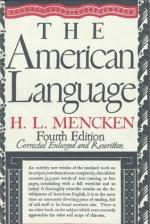
|
| Name: _________________________ | Period: ___________________ |
This test consists of 5 multiple choice questions, 5 short answer questions, and 10 short essay questions.
Multiple Choice Questions
1. Where was the broad "a" principally established prior to the Civil War?
(a) New England.
(b) The Southeast.
(c) The Midwest.
(d) California.
2. What does the English "secondary school" correspond to in American?
(a) Middle school.
(b) Elementary school.
(c) College.
(d) High school.
3. According to Mencken, democratic government is essentially government by whom?
(a) The working class.
(b) Amateurs.
(c) Politicians.
(d) Businessmen.
4. Which of the following was not used as a substitute for the once indecent term, for highly refined ears, "bull"?
(a) Male-cow.
(b) Standing-cow.
(c) Cow-creature.
(d) Gentleman-cow.
5. Which is the second factor that Mencken identifies as an impediment to the growth of the American language in Chapter 3.1?
(a) Regional diversity.
(b) Political disharmony.
(c) Lack of a national literature.
(d) Territorial expansiveness.
Short Answer Questions
1. What word does Mencken find Dr. John Dewey using in place of the word "opium?"
2. What "great humorist" does Mencken cite in Chapter 1.3 as "celebrating 'the vigorous new vernacular of the occidental plains and mountains'"?
3. What is the American substitute for the English word "tin"?
4. What country's works dominated the reading habits of the American colonists in the latter 18th century?
5. To what continent does Mencken attribute the acknowledgment of the differences between American and British English?
Short Essay Questions
1. In what way did the early political disunity of the United States hamper the growth of a national language, according to Mencken in Chapter 3.1?
2. In general, what is the relationship between foreign names for locations and American pronunciations?
3. What was Walt Whitman's role in the development of the national literature of the United States?
4. What is Mencken's evident attitude towards the vulgar American pronunciation of foreign loan-words?
5. How does a word move from legitimate vocabulary to slang vocabulary, according to Mencken?
6. Describe H.L. Mencken's attitude towards the American tendencies in the formation of new words.
7. What is the relationship between the mean and nasty labor done in the United States and the desire of immigrants to change their names?
8. In Chapter 1.2, whom does Mencken identify as chiefly responsible for the inhibiting of an American dialect?
9. What was the predominant attitude of philologists towards the study of American slang, at the time of Mencken's writing?
10. In general, how did Noah Webster influence American pronunciation?
|
This section contains 767 words (approx. 3 pages at 300 words per page) |

|




